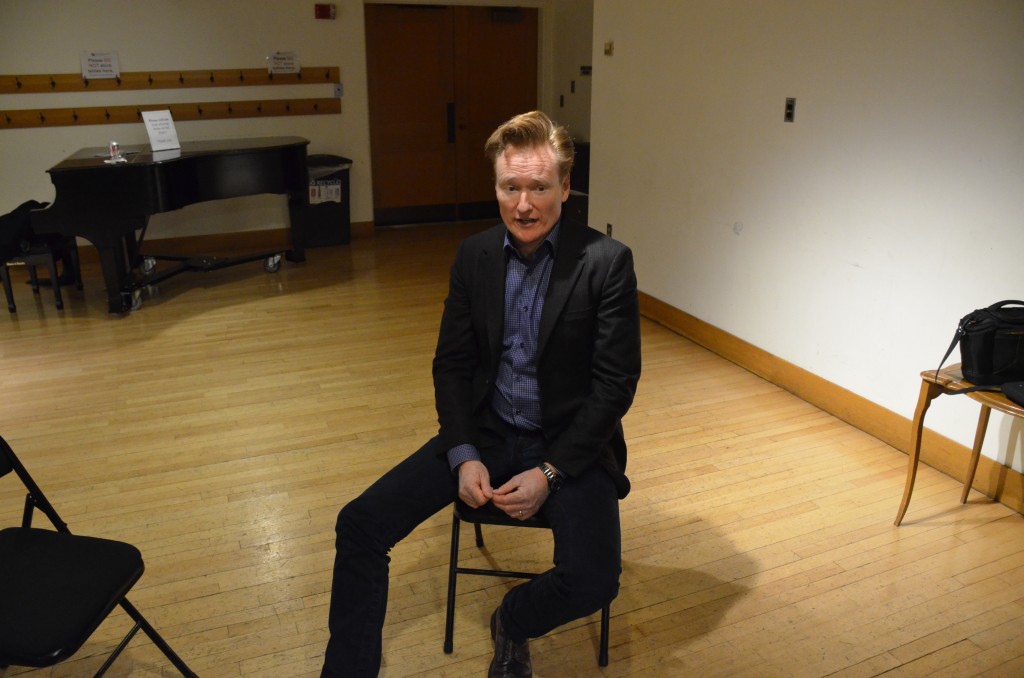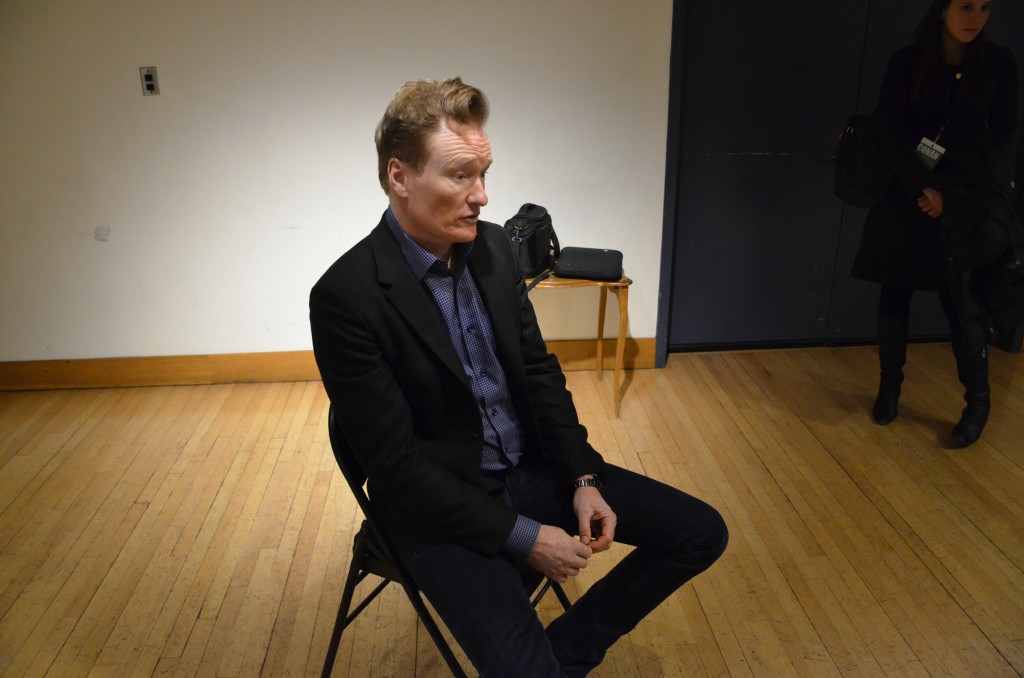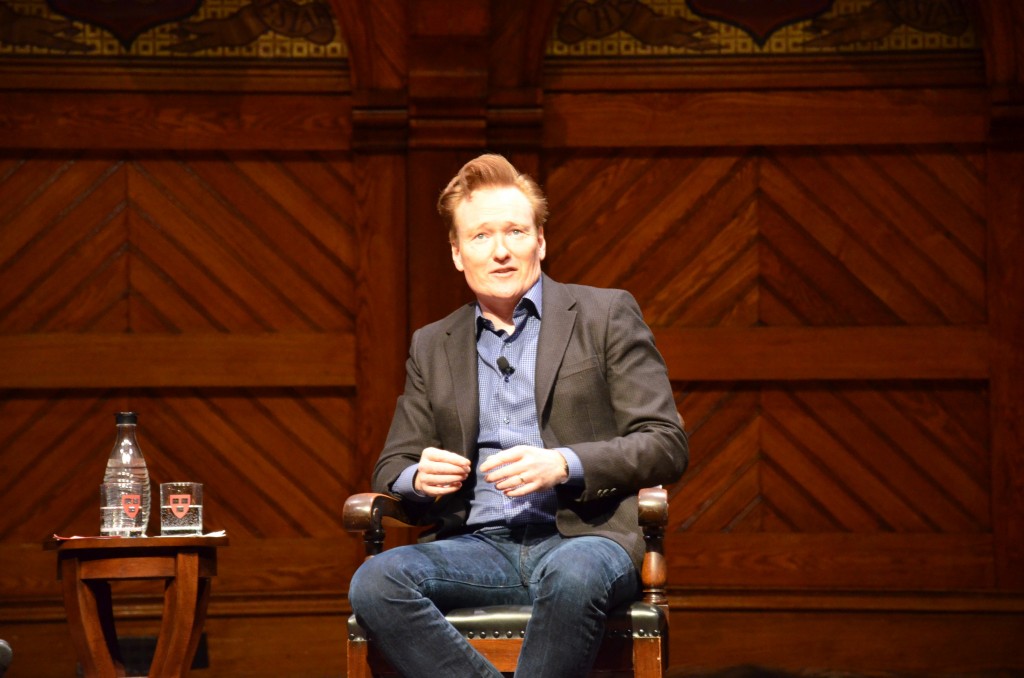Born in Brookline, Massachusetts, Conan O’Brien is an American comedian, writer, producer, and late-night talk show host. He is a member of Harvard’s Class of 1985, and while a student in the College, he served as president of The Harvard Lampoon. For his work on his late-night talk show, Conan, he has received a People’s Choice Award and a Primetime Emmy Award.
Harvard Political Review: I remember when Letterman was retiring, I read what you wrote in Entertainment Weekly—“Everything Was Wrong”. And so I was wondering if you consciously try to do a similar thing with your show, throughout your career?
Conan O’Brien: I wish I could say I consciously—I don’t consciously do that much. All I consciously do is try to make myself laugh and do that every day. And what I’ve found that’s refreshing is that if something really makes me laugh, it tends to make younger people laugh too. If it really makes me laugh, like hits me in the stomach. So, Kevin Hart and Ice Cube looking for weed with that young student driver—I could tell as we were doing it this is really funny and out of control, but there’s a really great spirit to it. Like, it just keeps escalating, you know? So as long as I’m doing that I feel like I’m on the right course. I wouldn’t say I start every day by like, “Let’s just try and be different.” I just try and think of what would make me laugh. And sometimes that’s different from—there are things that really make me laugh that won’t go viral. But that’s okay; I’d rather do the thing that makes me laugh. Sometimes the thing that makes me laugh will go viral, sometimes it won’t. But I want to start with what makes me laugh.
HPR: And do you feel a pressure to do things—is there a different pressure these days, starting in 1993 to now, to do something that goes viral?
CO: Yeah, I think it’s becoming—it’s the yin and the yang. There’s the good, and the not so good. The good part of it is, it used to be that if you weren’t up late you didn’t see the really funny thing that happened. Now, because things go viral, more people can see it. The downside is sometimes that’s all people see. So they only see the elements that go viral, but they don’t see the rest of the show, which also has a lot of work put into it. I don’t feel that pressure so much. I won’t lie to you: I love it when we do something and it goes viral and people like it, or it gets picked up a lot like my Cam Newton press conference bit I did the other night. That just felt funny to me, and I did it. And then the next day it’s everywhere, and people in the street are saying, “Hey Conan that was really funny.” I like it if it does go viral, but the first prerequisite is that I want it to be funny. There are ways I could go viral that wouldn’t be that funny, which is just doing something physical with a celebrity, and it will go viral. But that won’t always necessarily be something that makes me laugh. So I’m trying to have my cake and eat it too. You see what I’m saying?
HPR: Yeah, I see what you’re saying.
CO: I’m greedy that way. I want it to be funny, and then I want people to see it. I’m not going to lie to you and say that I don’t care if people see it or not, but my first rule is I’m a stickler for wanting it to be something that makes me laugh.
HPR: And you’ve always been doing those remote bits.
CO: Yeah, the nice thing is I started doing remotes in ’93, and—what year were you born?
HPR: Ninety-Five
CO: Ninety-five. You were born in ’95, so two years before you were born—
HPR: [Jokingly] I’m so sorry.
 CO: No, no, no—I like that. I actually think it’s kind of cool, because a lot of people that work for me are younger than you guys. I have college students that are nineteen that work for us, or eighteen. And this fascinates me, that when I walk around I get fifteen year old boys and sixteen year old girls that are like, “Oh my God, the ‘Clueless Gamer’ you did about…” you know, and I can’t believe they’re still a fan of mine. The Internet is, in some ways, taking away some of the judgment, or “Oh that guy—he’s the guy my older brother likes, and I can’t like him.” If you can come up with something funny, it can break across all lines. I have all these gamers in Sweden, or like I said these fans in South Korea, and my particular silly, weird brand of comedy appeals to them. So, that’s great. I love that.
CO: No, no, no—I like that. I actually think it’s kind of cool, because a lot of people that work for me are younger than you guys. I have college students that are nineteen that work for us, or eighteen. And this fascinates me, that when I walk around I get fifteen year old boys and sixteen year old girls that are like, “Oh my God, the ‘Clueless Gamer’ you did about…” you know, and I can’t believe they’re still a fan of mine. The Internet is, in some ways, taking away some of the judgment, or “Oh that guy—he’s the guy my older brother likes, and I can’t like him.” If you can come up with something funny, it can break across all lines. I have all these gamers in Sweden, or like I said these fans in South Korea, and my particular silly, weird brand of comedy appeals to them. So, that’s great. I love that.
HPR: I was wondering, since you went to Harvard during the Reagan Revolution era, were you politically active too?
CO: I was less politically active. I remember Casper Weinberger, the Defense Secretary, was going to go speak at, I think, Sanders Theater. And I think my roommate at the time said, “Come on, we’re all going to wear black cloaks, stand, turn, and point at him like we’re Death and he’s”—and I was like, What? I remember just that it wasn’t me. I was not a firebrand politically. My humor has never been overtly political.
HPR: That’s why I ask.
CO: Yeah, not that I have anything against that, because I don’t. I always liked comedy that had a little bit more—I liked silliness, I liked it to be a little agnostic. The comedy I’m proudest of is not Republican or Democrat, or liberal; it is looking at people. It is looking at the absurdity of people. I find people are silly, and then they happen to be both Democrat and Republican. So that’s always been my take on it. But I was not someone who was throwing paint at [then-Secretary of State] George Shultz when his car went by. I probably wouldn’t have recognized him if I saw him.
This interview has been edited.
Image source: Joe Choe

